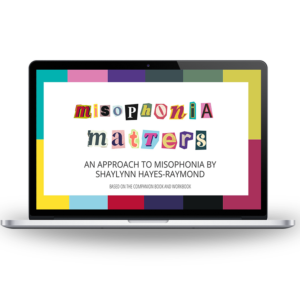
As scientists run around telling the world that the “treatment” for misophonia is Cognitive Behavioural Therapy, I think it is important to note that any findings on CBT that have been seen are akin to that of a coping skill — they help deal with the emotional after-effects of misophonia, not the misophonic moment, and certainly not as a preventative measure. You cannot CBT the misophonia away, and you surely should not be out there referring to CBT as a ‘treatment’ for misophonia. This is a disingenuous move by researchers, clinicians, and those involved in the use of CBT to skew public perception on CBT.
I am not saying that CBT is not helpful for misophonia. Like all coping skills approaches there is room for CBT in the room when we are trying to help people with misophonia mitigate the after-effects of the disorder and learn how to live in a world that is not accommodating to their sensory needs. Yet, this does not mean that CBT is the be all and end all, and it absolutely does not mean that we should be toting things like exposure therapy (if exposure worked we’d all be cured, none of us can completely ignore stimuli). Misophonia is also not a behavioural disorder. We do not learn to hate sounds and we cannot learn not to. In fact, saying that misophonia is “hatred of sounds” in general is untrue because there is already proof that there is a brain basis and the amygdala and fight-flight are involved (Kumar, 2018).
I understand that scientists are using the language they are used to, but they should be cautious when explaining any cognitive based, or even sensory-based skill for misophonia as a “TREATMENT”. The very word treatment assumes that misophonia can be mitigated by the skills learned, and that is simply not true. CBT is helpful to take the edge off and learn how to understand misophonia through worksheets and psychoeducation, but that does not mean that it should be referred to as a treatment. In-fact, I’d wager that calling anything a treatment at this point in time is nothing more than wishful thinking.
Much of the problem, I assume, is the reliance on “treatments” in American medicine and ‘psychiatric care’. The use of insurance codes means that specific interventions must be referred to as a treatment to be approved for use and reimbursement. Frankly, this entire practice is backwards and wrong, and is why in places like Canada where I live this is unheard of and only muddies the waters when it comes to the expectations of those receiving these “treatments”. Instead, practitioners and researchers should be honest and explain CBT for what it is, a coping skill for the disorder, and not the be all and end all approach to helping sufferers.
References
Brout, J. J., Edelstein, M., Erfanian, M., Mannino, M., Miller, L. J., Rouw, R., Kumar, S., & Rosenthal, M. Z. (2018). Investigating misophonia: A review of the empirical literature, clinical implications, and a research agenda. Frontiers in Neuroscience, 12, https://doi.org/10.3389/fnins.2018.00036
Kumar, S., Tansley-Hancock, O., Sedley, W., Winston, J. S., Callaghan, M. F., Allen, M., Cope, T. E., Gander, P. E., Bamiou, D., & Griffiths, T. D. (2017). The brain basis for misophonia. Current Biology, 27(4), 527–533.
Misophonia Coping Skills Class with Shaylynn Hayes-Raymond

Take the class on demand. Or, find a live class.
If you are looking for misophonia coping skills, you can go here to see coaching (worldwide) and here to see therapy (Canada) options with Shaylynn Hayes-Raymond. Shaylynn also offers both live and on-demand webinars for misophonia.

